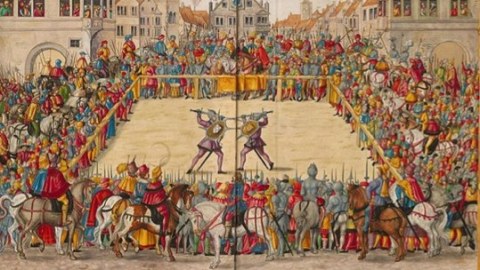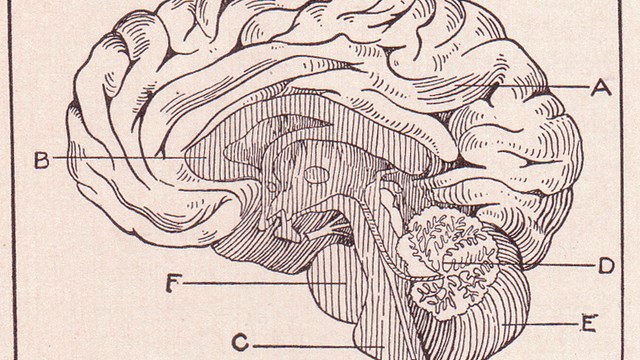Is Humanity Getting Less Violent? Or Just Better at Hiding Its Violence?

The premiere of Handel’s Messiah, in Dublin in 1742, was a very hot ticket, with an audience of 700 in the 600-seat theater. Hence, gentlemen were asked to come without their swords.
Think about that for a moment: Highly civilized people, who appreciated this wonderful music at least as much as we do, thought it perfectly normal to go about urban life with a deadly weapon. Yes, we here in the 21st century U.S. have our wingnuts running about trying to order lattes and burritos with AK-47’s strapped to their chests, but their demonstrations make the contrast even more clear. The “open carry” gun demonstrators are a small minority who emphasize their restraint and responsibility. The point of wanting to carry a gun into a Starbucks is to show that you won’t use it. In 18th century Europe, though, being armed was the norm for respectable gentlemen. And the number of duels fought all over the continent suggests that the admired man was the one who used his weapon, not the one who kept it sheathed.
European history for the past few centuries has seen a march away from personal violence in defense of one’s person, stuff and honor. Since the beginning of the 18th century, the nation-state took on the power to defend and punish that once belonged to individuals.
That point is made in a new and profound way by this fascinating study of trial transcripts from London’s Old Bailey, out in the Proceedings of the National Academy of Sciences. Sara Klingenstein, Tim Hitchcock, and Simon DeDeo subjected records from more than 100,000 trials, from 1760 to 1913, to a computational analysis. By tracking the rise and fall of words in proceedings over the centuries, they were able to identify and quantify the passage of personal violence from a routine part of everyday life to a special category of heinous crime. In earlier years, talk of violence appears everywhere in the records—in the 18th century, cases of forgery or theft are as violent-sounding as cases of assault. But the mid-19th century, the two sorts of trials use different words and concepts. The change, the authors write, is steady and gradual—the result of slow, profound shifts in society, rather than any particular revolution or policy.
The next phase in this evolution away from a Game of Thrones world took place among those states that had taken over the business of punishment and revenge. Governments with these powers used violence less and less. Consider the death penalty: In the 18th century, you could be hanged (or worse) in London for forgery or for stealing a watch (as Sandy Blakeslee reported in her New York Times piece on the Old Bailey research). Today in much of Europe the state won’t put you to death even if you kill 77 people.
Might there be something inevitable about this march away from mayhem and gore, first for individuals and then for their governments? I’d be inclined to say no, but I wonder. In the two biggest nations that still execute criminals—China and the United States—a change could be dawning similar to what happened in Europe. Earlier this week Brian Knowlton reported in the Timesthat American executions are fewer, and polls suggest that support for the death penalty (though still a majority view) is down a lot from where it was 20 years ago. And according to the criminologist Roger Hood China is also beginning to retrench on capital punishment.
So is the march away from mayhem inevitable? I’m not so sure. For one thing, even in well off and peaceful nations there are large stretches of territory where that Game of Thrones world still exists, and young men (in particular) learn that they can count only on their own fighting prowess to maintain the respect of others and their own safety. (Ta-Nehisi Coates lucidly explains it here.) Secondly, it seems wrong, empirically and maybe morally, to gauge the world’s violence level by the relative freedom of some people from being mugged or punched. In order to secure the comfortable and violence-free neighborhoods of which rich nations are proud, a great deal of violence is done to people who don’t live there. This occurs both within nations (see Coates again) and among nations. Are we who live in the United States really so self-involved that we can say the world is less violent, when our drones are raining fiery death on people all the time? Don’t we have to reckon the killings and brutality that are happening out of our sight as well as the peace and security we experience directly? Steven Pinker has argued that the overall trend nonetheless is downward. Nonsense, says the terrifyingly clear-sighted philosopher John Gray. What has happened, he writes, is that “in much the same way that rich societies exported their pollution to developing countries, the societies of the highly-developed world exported their conflicts.”
In 2014 in Dublin you don’t need to carry around a sword to keep your self-respect. Perhaps that means the sum total of mayhem in the world has declined. But there’s an argument to be made that it has simply moved to places where the citizens of Dublin (and New York and Shanghai) don’t have to see it.
Klingenstein, S., Hitchcock, T., & DeDeo, S. (2014). The civilizing process in London’s Old Bailey Proceedings of the National Academy of Sciences DOI: 10.1073/pnas.1405984111
Illustration: A day in court in Germany, circa 1550. Via Wikimedia
Follow me on Twitter: @davidberreby





